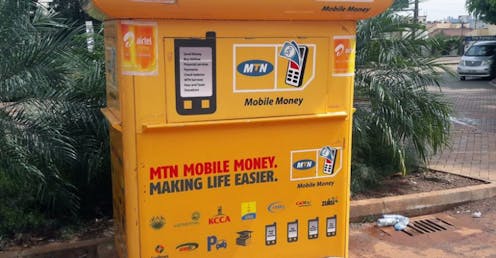
Mobile money is an essential retail financial service offered by telecommunications and other financial institutions in sub-Saharan African countries. The region recorded 159 million active users of mobile money in 2020 and US$490 billion in transaction value. People use the services to send money to each other, pay bills, disburse funds in bulk and pay merchants. Users can receive, save, send and spend money via their mobile phones without directly involving a bank or owning a bank account.
A study by the World Bank indicates that mobile money services have a positive impact on poverty reduction. Poverty is not just about lack of money, but also lack of access to formal financial systems. Mobile money services can enhance financial inclusion by providing access to savings, credit and insurance services.
In Ghana, mobile money services are provided by telecommunications companies like MTN Ghana, Vodafone and AirtelTigo. The Bank of Ghana reports that the cheques cleared for mobile money transactions amounted to US$2.82 Billion for January 2021. The Bank of Ghana also reports that in 2021, there were 40.9 million registered mobile money accounts and 17.5 million active accounts.
The International Finance Corporation reports that Ghana is the fastest growing market for mobile money services in Africa.
Though these services clearly have a lot to offer, there is more to learn about their growth potential and how to develop it.
Improving the quality of services is known to be an effective way to promote the patronage of services. Better quality gives a service provider a sustained competitive advantage.
As marketing researchers, we undertook a study to evaluate the factors that might influence service quality in the mobile money context in Ghana. Essentially, we wanted to know what customers want from mobile money services.
We found that customer satisfaction and continued use of a service were influenced by different factors. These findings may assist mobile money service providers and policymakers in planning services that will increase customer satisfaction and retention.
Study of frequent users
The study used a quantitative research method based on 494 frequent users of mobile money services. Of the respondents, 159 (32.2%) were men and 335 (67.8%) women. The age group of 25–40 made up the bulk of the sample (70.9%). Most respondents had degrees (64.4%). And 57.6% of the respondents had used the service for more than three years.
We assessed mobile money service quality in these terms:
people’s perception of service availability
expertise of service employees
facilities that help in delivering the service
availability of network operators
responsiveness of the service provider
continued usage of services.
We found that the availability of services, facilities, and security influenced customer satisfaction. The expertise of the service provider, the operator’s network system, and responsiveness influenced the continued use of mobile money services.
Customer satisfaction
The analysis revealed that the expertise of mobile money vendors, operator network system service quality and responsiveness of the service were important to customers. It is notable that, since vendors and other employees providing mobile money services represent the service provider, their knowledge and ability affect customer satisfaction.
But this did not influence customers’ continued use of the services. Our analysis showed that people continued to use services even if they were not satisfied with the facilities, the service available or the level of security provided.
Our study revealed that unavailable services prompted users to switch to another mobile money service provider. Therefore, users need convenient access to vendors to perform transactions. These touch-points will ensure mobile money services are provided without delays. Vendors will thus help the service providers to keep their service promises, which would enhance user satisfaction and the continued usage of the service.
Network availability in the mobile money services context is vital to ensure user participation and effective service delivery. For instance, if a service provider’s network is not fully functional for hours, this could affect the quality of mobile money services offered. Such network problems are frequent and interrupt service delivery.
Improving service quality and usage
The results of our survey suggest several ways that service providers could do better and reap the benefits of satisfied customers.
Service providers should improve on their ability to provide information and tools on the mobile money platforms for users to access. They need to train mobile money vendors across the country to ensure high standards and empower them to resolve customer complaints.
Services should be offered at convenient locations. There should be a regular and stable network to avoid interruptions and deliver services fast.
Service promises should be met without delay. Access to services should be unlimited and involve less effort for customers. This can be done by increasing service points and finding innovative ways to deliver services across many other technological platforms.
Service providers should pay close attention to the environment for mobile money transactions. Issues like ventilation, waiting lines and the appearance of staff need attention.
Mobile money service providers should ensure maximum security for all mobile money transactions. When there is a security breach that leads to loss of money, users are likely to stop using the service. Security can be improved through robust verification of identification for all transactions. Users also need timely information about transactions.
The authors do not work for, consult, own shares in or receive funding from any company or organization that would benefit from this article, and have disclosed no relevant affiliations beyond their academic appointment.
This article was originally published on The Conversation. Read the original article.







